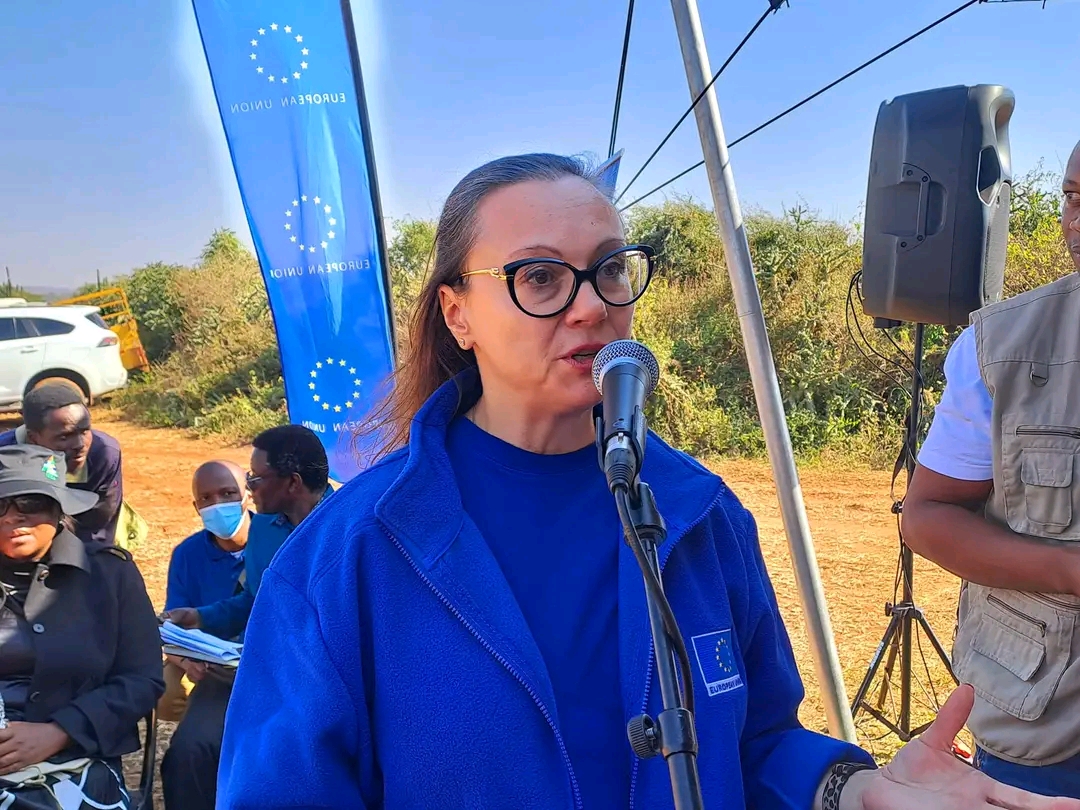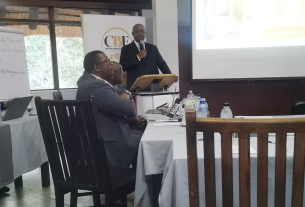BY MBONO MDLULI
MBABANE – The European Union (EU) has spent an amount of E3.4 billion on Eswatini in the past 15 years.
This was revealed by Minister of Economic Planning and Development Dr Thambo Gina on Thursday (July 25, 2024). This was during the launch of the Eswatini Livestock Value Chain Development Programme (ELVCDP) valued at about E183 million (€9.15 million). The launch took place at Lubulini Dip Tank.
The European Union (EU), International Trade Centre (ITC), and the Government of Eswatini have jointly launched the project.
It was attended by the European Union Ambassador to the Kingdom of Eswatini Dessislava Choumelova, Minister of Agriculture Mandla Tshawuka, Minister of Economic Planning and Development who is also Lubulini Member of Parliament Dr. Tambo Gina, Lubombo Regional Administrator Themba Msibi, Ministry of Agriculture Parliament Portfolio Committee Members, ITC Chief, Sustainable and Inclusive Value Chain Vanessa Erogbogbo, Chiefs from the surrounding areas, various stakeholders within the livestock value chain, farmers, and community members.
Speaking during the event, Dr Gina, who is also Lubulini Member of Parliament (MP), talked about the support in highlighting the EU’s long-standing partnership with Eswatini. “In the past 15 years, the EU has provided support worth E3.4 billion to the Kingdom of Eswatini. We thank the EU for remaining one of the country’s steadfast development partners. We further ask them to continue working with the Government to improve the lives of Emaswati,” Gina said.
Gina said he strongly believed that the livestock project would benefit a lot of Emaswati because agriculture and livestock farming contributed a lot to national development and poverty alleviation.
“I am confident that this funding from the EU will play a significant role in developing, strengthening, and sustaining the beef and goat value chain. The EU’s prioritization of the agriculture sector, particularly livestock production, aligns with our strategic intent and will significantly contribute to curbing unemployment, creating wealth, and injecting economic growth,” he said.
The minister further revealed that beef as a commodity generated E469 million towards improving the economy of this country. “The potential for growth in this sector is huge, especially for goat production. Prudent controls have kept us free of foot and mouth disease, thus our options to export to all countries remain open. The numbers reveal that we have not tapped into this great potential and we need to do so now.” He said even the EU and Norway markets remain unsaturated.

EU Ambassador Dessislava Choumelova emphasised the project’s alignment with global environmental and economic goals. “The EU is a global champion of climate action, environmental protection, and biodiversity conservation. This project addresses these challenges while improving livelihoods and contributing to poverty reduction. It also seeks to promote inclusive economic transformation, focusing on youth and women in the value chain,” Choumelova said.
ITC Chief, Sustainable and Inclusive Value Chain Vanessa Erogbogbo praised the collaborative effort from the project partners. “This momentous occasion marks the beginning of a new chapter in our collective efforts to improve the livestock sector, a cornerstone of the country’s agricultural landscape. The shared vision of the project partners is to develop a livestock value chain creating sustainable and inclusive growth opportunities for all stakeholders involved,” she said.
Speaking on behalf of the farmers, Musa Gumbi expressed optimism about the project’s impact on rural communities. “The launch of this project marks the beginning of a new ear for farmers in Lubulini. Advanced breeding techniques and the provision of animal feed supplements will significantly improve the genetic quality and nutrition of our livestock. The introduction of auction sales will open up new income opportunities,” he said.
Lubombo Regional Secretary Zandile Dlamini underscored the cultural and economic significance of livestock in Eswatini. “We believe that supporting smallholder farmers will improve access to markets, finance, and knowledge. This project will have a significant impact on the lives of our people, empowering them to take greater control of their livelihoods,” Dlamini said.
Lubombo Regional Administrator Themba Msibi conveyed his enthusiasm for the project noting that the project will benefit the whole country, even though it has been launched at Lubulini. “We thank the EU for supporting this initiative. Our role now is to ensure its success to improve the lives of Emaswati.”
The launch event included a commitment to provide Lubulini farmers with a new dip tank to improve livestock health and efficiency. Additionally, addressing the issue of livestock theft was highlighted as a priority to ensure the project’s benefits reach all farmers.








